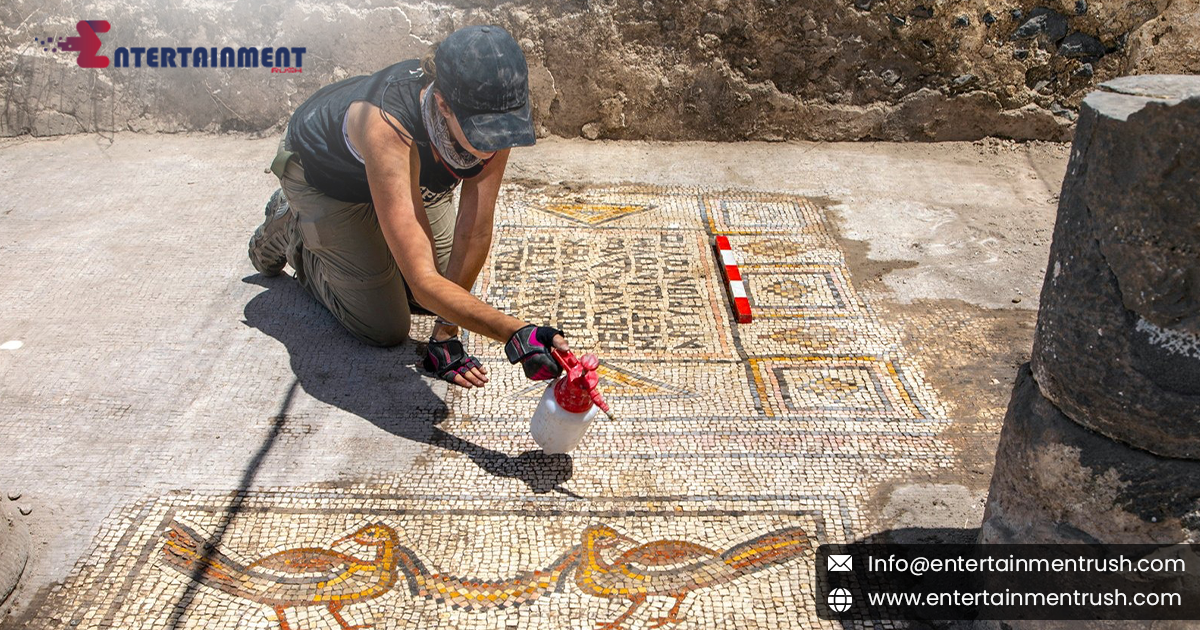In a remarkable discovery that has captured the attention of historians and art enthusiasts alike, archaeologists have uncovered an ancient mosaic that has remained hidden beneath the earth for thousands of years. This extraordinary find was made in the ancient city of Rutupiae, now known as Richborough, located in Kent, England. The excavation has provided a rare glimpse into the artistic and cultural achievements of ancient civilizations, offering new insights into the lives of those who created and admired this intricate work of art.
The Discovery in Richborough
The ancient city of Rutupiae, or modern-day Richborough, was once a bustling Roman port town, serving as a gateway between Britain and the rest of the Roman Empire. Over the centuries, the city fell into ruin, and much of its rich history was buried beneath layers of soil and vegetation. It was during a routine excavation in this historic area that archaeologists uncovered the ancient mosaic, a find that has since been hailed as one of the most significant discoveries in recent years.
The mosaic, which dates back to the Roman period, is an exquisite example of the intricate artistry that characterized much of Roman architecture and design. Composed of thousands of tiny, colored tiles, the mosaic depicts scenes of everyday life, mythological figures, and elaborate geometric patterns. The vivid colors and detailed craftsmanship have been remarkably well-preserved, despite being buried for centuries, making this discovery all the more extraordinary.
The Significance of the Mosaic
The focus key phrase, “Archaeologists uncover ancient mosaic hidden for thousands of years,” encapsulates the importance of this discovery. The mosaic is not just a beautiful piece of art; it is also a valuable historical artifact that offers insights into the cultural and social dynamics of the time. The scenes depicted in the mosaic provide a window into the daily lives of the people who lived in Rutupiae, their beliefs, and the aesthetic values that were important to them.
The discovery of the mosaic in Richborough adds to our understanding of the Roman presence in Britain. It serves as a reminder of the extensive influence of the Roman Empire, even in far-flung corners of the world. The mosaic’s design and subject matter are reflective of the broader artistic trends of the Roman world, suggesting that the people of Rutupiae were well-connected to the cultural currents of the time.
The Excavation Process
Uncovering an ancient mosaic that has been hidden for thousands of years is a painstaking process that requires a great deal of care and expertise. The archaeologists involved in the Richborough excavation used a combination of traditional digging methods and modern technology to carefully expose the mosaic without damaging it. Once uncovered, the mosaic was meticulously cleaned and documented, with experts working to preserve the delicate tiles and prevent further deterioration.
The excavation team also conducted a thorough analysis of the surrounding area, looking for clues that might provide additional context for the mosaic. This included examining the remains of nearby structures, pottery shards, and other artifacts that could help piece together a more complete picture of life in ancient Rutupiae. The results of this analysis are expected to provide valuable insights into the history and development of the city.
Future Implications
The discovery of the mosaic has generated considerable excitement in the archaeological community, with many experts eager to see what further excavations in the area might reveal. There is hope that additional mosaics or other significant artifacts may still be waiting to be uncovered, offering even more opportunities to learn about the ancient world.
For the public, the mosaic represents a tangible connection to the past, a reminder of the rich history that lies beneath our feet. Plans are already underway to display the mosaic in a museum, where it can be studied and admired by visitors from around the world. This will not only help to preserve the mosaic for future generations but will also allow people to appreciate the artistry and craftsmanship of those who lived thousands of years ago.The discovery of the ancient mosaic in Richborough is a testament to the enduring legacy of the Roman Empire and the skill of the artists who created such intricate works of art. As archaeologists uncover this ancient mosaic hidden for thousands of years, they bring to light not just a beautiful artifact but also a piece of history that helps us better understand the past.
The excavation in Richborough is a reminder of the importance of archaeology in uncovering the stories of our ancestors and preserving them for the future. As more discoveries are made, we can look forward to learning even more about the rich and diverse history of the ancient world, one mosaic at a time.




Leave feedback about this